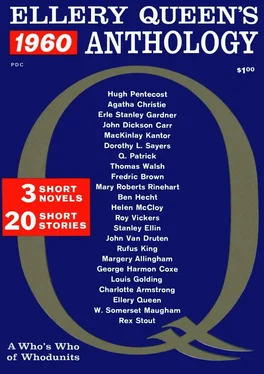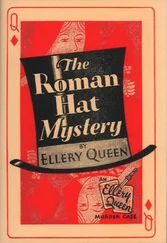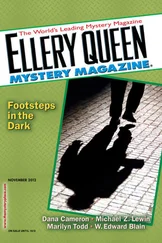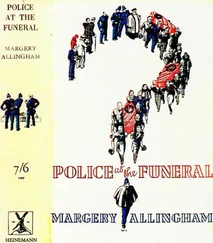“We made that one without any help.”
“And it still holds?”
“Yes.”
“Good. That’s fortunate, since all of my assumptions concern that object. The second is that Wallen had it with him when he came here. I can support that with sound—”
“You don’t need to. We made it and we hold it.”
“Very well. That saves time... Not too short back there, Jimmie.”
“No, sir.”
“The third is that he had the object inside the newspaper he was carrying. This is slenderer, but it must be tested. He had not bought the paper shortly before coming here, for it was an early edition of the Daily Press , on sale last evening, not on sale this morning. It was not merely stuffed in his pocket, he had it in his hand; not rolled up, but folded over once. It is—”
“You know a lot about it,” Cramer growled.
“Do me later,” Wolfe snapped. “I know nothing you don’t know. It is difficult to account for him carrying a stale newspaper in that manner except on the assumption that it was a container for some object — at least, the assumption is good enough to work on. The fourth is that whatever the object was, the murderer got it and disposed of it. More than an assumption, that is. No object that could have led him to this shop was found on Wallen’s person or in the booth, so if he had it the murderer got it. The fifth assumption is that the murderer was neither Carl nor Tina. I shall—”
“Ah,” Cramer said. “Tell us why.”
“No. I shall not support that assumption; I merely make it and submit it to our test. Don’t waste time clawing at me. Since Carl and Tina are not involved, and therefore didn’t take the object away with them, it is still here in the shop. That is the sixth assumption, and it is good only if your surveillance of these people here, all these hours, has been constant and alert. What about it? Could any of them have removed such an object?”
“I want to know,” Cramer demanded, “why you’re excluding Carl and Tina.”
“No. Not now.” Wolfe and Cramer couldn’t see each other because Jimmie was in between, starting on the top. “First we’ll complete this test. We must know whether the object has been removed, not by Carl or Tina.”
“No,” Purley said.
“How good a no?”
“Good enough for me. No man has stepped outside this shop alone. Something could have been slipped to a customer, but that’s stretching it, and we’ve had them under our eyes.”
“Not, apparently, the one who assaulted Miss Stahl.”
“That was in the shop. Is that a point?”
“I suppose not. Then we assume that the object is still here. The seventh and last assumption is this: that no proper search for such an object has been made. I hasten to add, Mr. Stebbins, that that is not a point, either. You and your men are unquestionably capable of making a proper search, but I assume that you haven’t done so on account of Carl and Tina. Thinking them guilty, naturally you thought they wouldn’t leave an incriminating object behind. Have you searched thoroughly?”
“We’ve looked.”
“Yes. But granting all my assumptions, which of course you don’t, has there been a proper search?”
“No.”
“Then it’s about time. Mr. Fickler!”
Fickler jerked his head up. “Me?”
“You run this place and can help us. However, I address all of you who work here. Put your minds on this. You too, Jimmie.”
Jimmie backed off a step and stood.
“This,” Wolfe said, “could take a few minutes or it could take all night. What we’re after is an object with something on it that identifies it as coming from this shop. Ideally, it should be the name and address or phone number, but we’ll take less if we have to. Since we’re proceeding on my assumptions, we are supposing that it was inside the newspaper as Wallen was carrying it, so it is not a business card or match folder or bottle or comb or brush. It should be flat and of considerable dimensions. Another point: It should be easily recognizable. All of you went to the booth and were questioned by Wallen, but he showed you no such object and mentioned none. Is that correct?”
They nodded and mumbled affirmatives. Ed said, “Yes!”
“Then only the murderer saw it or was told of it. Wallen must for some reason have shown it to him, or asked him about it, and not the rest of you; or its edge may have been protruding from the newspaper, unnoticed by the others; or the murderer may merely have suspected that Wallen had it. In any case, when opportunity offered later for him to dive into the booth and kill Wallen, he got the object. If Mr. Stebbins is right about the surveillance that has been maintained, it is still here in the shop. I put it to you, and especially to you, Mr. Fickler: What and where is it?”
They looked at one another and back at Wolfe. Philip said in his thin tenor, “Maybe it was the newspaper.”
“Possibly. I doubt it... Where is the newspaper, Mr. Cramer?”
“At the laboratory. There’s nothing on it or in it that could have brought Wallen here.”
“What else has been taken from here to the laboratory?”
“Nothing but the scissors and the bottle that was used on Miss Stahl.”
“Then it’s here... All right, Jimmie, finish.”
“It looks to me,” Purley objected in his bass rumble, “like a turkey. Even with your assumptions. Say we find something like what you want, how do we know it’s it? Even if we think it’s it, where does that get us?”
Wolfe was curt: “For one thing, fingerprints.”
“Nuts. If it belongs here, of course it will have their prints.”
“Not their prints, Mr. Stebbins. Wallen’s prints! If he picked it up in the car, he touched it. If he touched it, he left prints. As I understand it, he didn’t go around touching things here. He entered, spoke to Mr. Fickler, was taken to the booth, and never left it alive. If we find anything with his prints on it, we’ve got it. Have you equipment here? If not, I advise you to send for it at once, and also for Wallen’s prints.”
Purley grunted. He didn’t move.
“Go ahead,” Cramer told him. “Phone. Give him what he wants.”
“The search,” Wolfe said, “must be thorough and will take time. First I ask all of you to search your minds. What object is here, belongs here, that meets the specifications as I have described them, Mr. Fickler?”
Fickler shook his head. “I don’t know, unless it’s a towel, and why would he carry a towel like that?”
“He wouldn’t. Anyway, a towel wouldn’t help us any... Philip?”
“No, sir. I don’t know what.”
“Tom?”
Tom just shook his head, gloomily.
“Ed?”
“You’ve got me. Pass.”
“Miss Stahl?”
“I think he might have been keeping the paper because there was something in it he wanted to read. I don’t have time—”
“Yes. We’ll consider that... Jimmie?”
“I don’t know a thing like that in the shop, Mr. Wolfe. Not a thing.”
“Pfui.” Wolfe was disgusted. “Either you have no brains at all, or you’re all in a conspiracy. I’m looking straight at such an object right now.”
From behind I couldn’t see where his gaze was directed, but I didn’t have to. The others could, and I saw them. Eleven pairs of eyes, including Purley’s, who had finished at the phone and rejoined us, were aimed at the magazine table next to Janet’s chair, from eleven different angles. Up to that moment my brain may have been as paralyzed as the others’, but it could still react to a stimulus. I left the stool and stood right behind Wolfe, ready if and when needed.
“You mean the magazines?” Cramer demanded.
“Yes. You subscribe to them, Mr. Fickler? They come through the mail? Then the name and address is on them. For instance, that copy of Ellery Queens Mystery Magazine — the name and address of Mr. Fickler, or of The Goldenrod Barbershop, is stenciled on the mailing-wrapper which is still around the magazine. Surely it deserves examination.
Читать дальше












